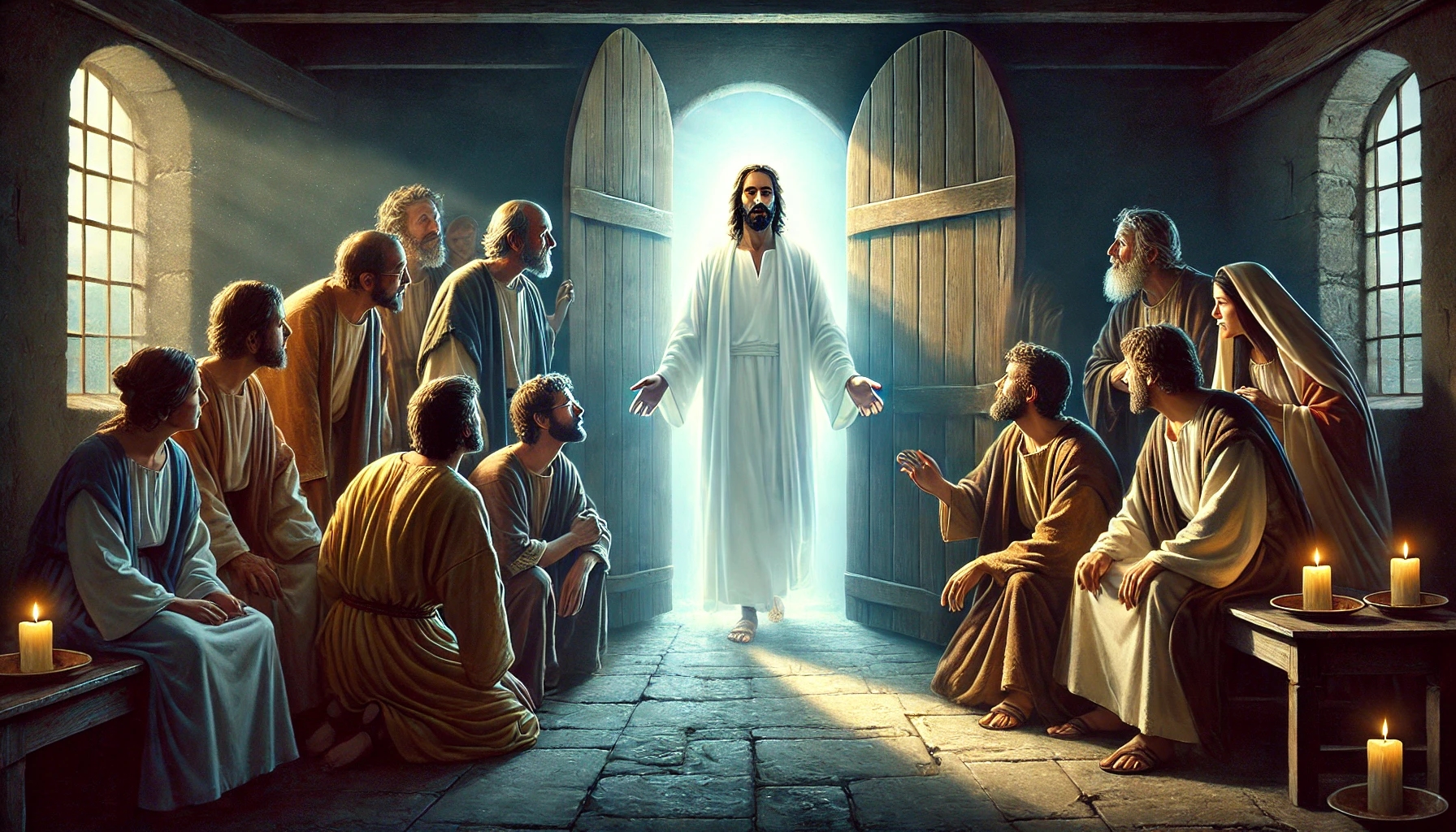
December 31, 2024
DAILY BIBLE READING – 2 Corinthians Chapter 5
1 For we know that if our earthly house of this tabernacle were dissolved, we have a building of God, an house not made with hands, eternal in the heavens.
2 For in this we groan, earnestly desiring to be clothed upon with our house which is from heaven:
3 If so be that being clothed we shall not be found naked.
4 For we that are in this tabernacle do groan, being burdened: not for that we would be unclothed, but clothed upon, that mortality might be swallowed up of life.
5 Now he that hath wrought us for the selfsame thing is God, who also hath given unto us the earnest of the Spirit.
6 Therefore we are always confident, knowing that, whilst we are at home in the body, we are absent from the Lord:
7 (For we walk by faith, not by sight:)
8 We are confident, I say, and willing rather to be absent from the body, and to be present with the Lord.
9 Wherefore we labour, that, whether present or absent, we may be accepted of him.
10 For we must all appear before the judgment seat of Christ; that every one may receive the things done in his body, according to that he hath done, whether it be good or bad.
11 Knowing therefore the terror of the Lord, we persuade men; but we are made manifest unto God; and I trust also are made manifest in your consciences.
12 For we commend not ourselves again unto you, but give you occasion to glory on our behalf, that ye may have somewhat to answer them which glory in appearance, and not in heart.
13 For whether we be beside ourselves, it is to God: or whether we be sober, it is for your cause.
14 For the love of Christ constraineth us; because we thus judge, that if one died for all, then were all dead:
15 And that he died for all, that they which live should not henceforth live unto themselves, but unto him which died for them, and rose again.
16 Wherefore henceforth know we no man after the flesh: yea, though we have known Christ after the flesh, yet now henceforth know we him no more.
17 Therefore if any man be in Christ, he is a new creature: old things are passed away; behold, all things are become new.
18 And all things are of God, who hath reconciled us to himself by Jesus Christ, and hath given to us the ministry of reconciliation;
19 To wit, that God was in Christ, reconciling the world unto himself, not imputing their trespasses unto them; and hath committed unto us the word of reconciliation.
20 Now then we are ambassadors for Christ, as though God did beseech you by us: we pray you in Christ’s stead, be ye reconciled to God.
21 For he hath made him to be sin for us, who knew no sin; that we might be made the righteousness of God in him.
King James Version. Public Domain
Commentary
Introduction
In the fifth chapter of the second letter to the Corinthians, Paul describes the hope of the heavenly home and the Christian life in faith. He explains the calling of believers as ambassadors of reconciliation and emphasizes how God, through Christ, has reconciled the world to Himself. This chapter encourages believers to live faithfully in the present world and to recognize their identity as a “new creation” in Christ.
Commentary
Longing for the Heavenly Home
Paul uses the image of an “earthly house” (our body) and contrasts it with an eternal, heavenly house. He describes the human longing for immortality and eternal fellowship with God. This life is only temporary, and the difficulties here are part of the journey to eternal glory. In this context, the Holy Spirit plays a central role as a pledge and guarantee of this future hope.
Paul emphasizes that Christians walk “by faith” and not “by sight.” This is a reminder that the Christian life is characterized by trust in God, even when the reality of heaven remains unseen. At the same time, he makes clear that each person will stand before the judgment seat of Christ and must give account for their life. This perspective should drive believers to please God, whether in earthly or heavenly life.
Ambassadors of Reconciliation
In this section, Paul calls the Corinthians to take their identity as ambassadors of Christ seriously. He explains that the love of Christ compels him to proclaim the Gospel, as through Jesus’ death and resurrection, a new relationship with God is offered to all people. The central idea is that God, through Christ, has reconciled the world to Himself, and this message of reconciliation is to be shared by believers.
Paul makes it clear that redemption through Christ brings about a transformation: whoever is in Christ is a “new creation.” The old life has passed away, and a new one has begun. This is not the result of human effort but a work of God. The climax of the chapter is the statement that Christ, who knew no sin, was made to be sin for us, so that in Him we might become righteous before God.
Summary
2 Corinthians 5 encourages believers to hope for the heavenly home and to live their lives in faith and reconciliation. Paul emphasizes that earthly life is transient and that true life is found only in fellowship with Christ. Christians are called to be ambassadors of reconciliation by sharing the good news of God’s love and grace. The chapter reminds us that through Christ, a new creation is possible, which overcomes the old life and brings eternal hope.
![]()

WEEKLY SPIRIT OF PROPHECY READING – Ellen White | The Desire of Ages
Chapter 83—The Walk to Emmaus
This chapter is based on Luke 24:13-33.
Read online here
Commentary
Introduction
The chapter “The Walk to Emmaus” depicts one of the most deeply moving events following the resurrection of Jesus, as described in Luke 24:13-33. Two disciples encounter the risen Christ on their way to Emmaus but do not recognize him immediately. This event illustrates the importance of scripture, the necessity of faith, and the transformative power of the knowledge of Jesus.
Commentary
The disciples are wandering in deep disappointment and despair, unable to comprehend the significance of the events surrounding Jesus’ crucifixion and the reports of his resurrection. Their lack of understanding and faith reflects the human need to recognize God’s plan in difficult times. Jesus approaches them unrecognized, listens to their sorrow, and begins to explain the Old Testament scriptures. This teaching conversation shows that Christ is present throughout the entire Bible and that his mission is confirmed by the prophetic predictions of the Old Testament.
The way Jesus addresses the disciples is both gentle and instructive: he lovingly rebukes them for their unbelief and opens their eyes through the scriptures. Only when the breaking of the bread occurs do they recognize him and understand the depth of his presence and mission. This encounter makes it clear that faith and understanding of scripture are the foundation for a fulfilled life in Christ. It was not a miracle, but the scriptures and fellowship that ignited their hearts.
The chapter also emphasizes the joy and urgency of conveying the message of the resurrection. The disciples leave everything behind to return to Jerusalem and proclaim the Gospel. Their encounter with Christ transforms their sorrow into hope and their doubt into certainty.
Summary
The Walk to Emmaus is a message of hope, insight, and transformation. The story shows how Jesus explains his mission through scripture, transforms doubt and grief into faith and joy, and makes the disciples witnesses of his resurrection. This event reminds us that Christ is always near, even when we do not recognize him immediately, and that through understanding the scriptures, our hearts can be ignited for the truth and joy of the Gospel. It encourages us to share this truth with zeal and courage.

WEEKLY SPIRIT OF PROPHECY READING – Ellen White | The Desire of Ages
Chapter 84—“Peace Be Unto You”
This chapter is based on Luke 24:33-48; John 20:19-29.
Read online here
Commentary
Introduction
The chapter “Peace be with you!” describes the events following the resurrection of Jesus, where He appears to the disciples, strengthens their faith, and brings them peace. It is based on the accounts in Luke 24:33-48 and John 20:19-29. These encounters reveal the deep mercy and patience of Jesus towards His disciples, who, despite His repeated teachings, struggled to comprehend His resurrection.
Commentary
The appearances of Jesus after His resurrection are marked by a message of peace, forgiveness, and new life. Jesus unexpectedly enters the midst of the disciples and greets them with the words “Peace be with you!” This greeting reflects the core message of the Gospel: reconciliation with God and inner peace despite external uncertainty. By showing them His pierced hands and feet, He strengthens their faith by answering doubt with the reality of His resurrection.
A key message of this chapter is that Jesus approaches the doubters with love and patience, as in the case of Thomas. Thomas, who reacts skeptically to the reports of the others, receives exactly the evidence he demands from Jesus. However, Jesus gently admonishes that greater blessings await those who believe without seeing. This is an invitation to trust, even when not all questions are answered.
Furthermore, the chapter emphasizes the importance of the Holy Spirit, which Jesus breathes into the disciples to prepare them for their mission. Without the Spirit of God, they are unable to preach the forgiveness of sins and spread the Gospel to the world. The gift of the Holy Spirit is essential to continue Christ’s work.
Summary
The chapter “Peace be with you!” demonstrates Jesus’ loving manner in renewing the faith of His disciples, dispelling their doubts, and preparing them for their mission. His words and actions after the resurrection call for finding peace and faith, even when external evidence is lacking. The disciples were equipped with the truth of Jesus’ life, death, and resurrection and sent out to share this message with the world. This chapter reminds us that Jesus meets every doubt with patience and love and that the Holy Spirit is the key to serving in His name.
(Visited 25 times, 1 visits today)




















